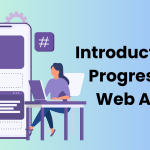A plethora of technologies are being used in terms of mobile applications. There are mobile websites, mobile web apps, mobile hybrid apps, and native apps when it comes to mobile applications. To choose from any one among all these options is a do or die situation for businesses. Every alternative comes with its own merits and demerits. You must look out for relative advantages to make informed selection.
At once, they all look alike, which is true to some extent. As there is not huge differences, but enough to make or reject one over the other.

To clear the air and to understand various types of apps, let’s try to conduct a comparative analysis of mobile web apps and native apps and confusing terms, examining various aspects to help you evaluate which option aligns best with your specific requirements.
First Things First: Websites vs. Web Apps
Websites serve as informational platforms where users consume content, while web apps are interactive software applications that enable users to perform specific tasks and engage in complex interactions. Websites focus on delivering information and providing a pleasant browsing experience, while web apps focus on interactivity, user engagement (such as e-Commerce, user timeline etc).
Mobile Websites vs. Mobile Web Apps
Mobile web apps and mobile websites are both accessed through mobile devices but have distinct characteristics. Mobile websites are designed for mobile browsers and are responsive versions of desktop websites, offering a mobile-friendly browsing experience. They provide information and content consumption.
On the other hand, mobile web apps are interactive applications that run within a mobile browser but offer functionalities beyond content consumption. They allow users to perform tasks, interact with data, and often provide a more app-like experience.
Native Apps & Mobile Web Apps
Native apps, as the name implies, caters to the specific needs of a platform (e.g., iOS or Android) using platform-specific programming languages. They are installed on the device through app stores and have full access to device features and capabilities. Utilizing device-specific features like the GPS, camera, and push notifications, native apps may offer a high-performance user experience.
Mobile web applications, on the other hand, don’t require installation and work across platforms. They are websites optimized for mobile devices, and offer a responsive user experience. While they may not have access to all device features, advancements in web APIs have allowed mobile web apps to leverage functionalities like geolocation and offline storage.
The choice between native apps and mobile web apps depends on factors such as the desired user experience, required device capabilities, development resources, and target audience. Native apps excel in providing a platform-specific experience with full device integration, while mobile web apps offer cross-platform compatibility and easier maintenance.
Hybrid Apps
The creation of hybrid applications involves fusing components from mobile web apps and native apps. Hybrid apps, on the other hand, are packaged as native applications and may be installed on a user’s device, in contrast to mobile web apps that operate within a web browser.
Frameworks like Apache Cordova (sometimes referred to as PhoneGap) or React Native are used by hybrid apps to bridge the gap between web technologies and native device capabilities. This allows hybrid apps to access certain device features and functionalities, such as camera, contacts, and geolocation, using native APIs. Hybrid apps reduce the time and effort of individually developing and deploying apps for multiple platforms by using the same codebase.
Key Differences Between Mobile Web Apps and Native Apps
Development and Maintenance
They offer a consistent development stack across different platforms, reducing the development time and cost for app developer associated with building separate native apps.
Cross-Platform Compatibility
Cross-platform support is a significant merit of mobile web apps. They don’t require separate programming to operate on a variety of devices and platforms, including Windows, iOS, and Android. This broad compatibility enables businesses to reach a larger audience and reduces the effort required to maintain many app versions. Native apps need the development of separate codebases for different platforms, increasing development complexity and cost.
User Experience
Since native apps offer specific features with respect to a particular device, their user experience is stunning. They can leverage hardware capabilities such as GPS, camera, accelerometer, and push notifications, resulting in seamless integration with the device’s native features.
Distribution and Installation
App stores are the distribution channels for native apps, which consumers must download and install on their devices. This can be a hassle for many users since they have to wait for downloads, find storage for the software etc in case of native apps. On the other hand, mobile web applications are free from any such inconveniences. They can be easily accessed via web browsers and don’t need any formal installation.
Comparing PWAs and HTML5 Web Apps
While HTML5 web applications and Progressive Web applications (PWAs) are both web-based application techniques, they differ in a few key ways.
Progressive online Apps (PWAs) are the next generation of online apps that mimic native behavior by utilizing progressive web technologies. Their design prioritizes speed, responsiveness, and offline functionality.
On the other side, HTML5 web apps are websites created using HTML, CSS, and JavaScript that utilize the most recent HTML5 capabilities and standards. With HTML5, developers may construct more complex and dynamic online apps because of its improved multimedia, graphics, and data storage capabilities.
Final Words
The decision between native applications and mobile web apps is influenced by a number of variables, such as discoverability, user experience, distribution channels, cross-platform compatibility, development and maintenance expenses, and app developer fees. Benefits of mobile web applications include affordability, cross-platform interoperability, simpler maintenance, lower costs for app developers, and increased accessibility. Conversely, native applications provide a dedicated place in app stores, complete access to device functionality, and a more seamless user experience. Assess your unique needs and priorities to ascertain which choice best fits your target market and company goals. Making a choice requires a deep comprehension of the trade-offs and the kind of user experience you hope to provide.







